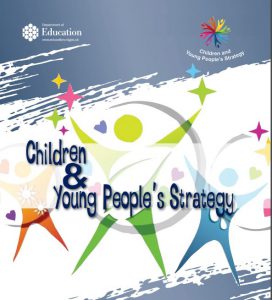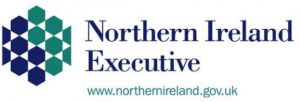In 2006, the Executive’s Ten Year Strategy for Children and Young People – Our Pledge was launched. The Strategy outlined how the Executive would improve the well-being of our children and young people in areas such as education, health, environment, rights etc This Strategy, which was developed following significant consultation with stakeholders, concludes in 2016 and the Department of Education is beginning the process of developing a new Strategy.
The new Strategy will be expected to consider the key issues facing children and young people and outline how Government will work collaboratively to improve the well-being of  our children and young people.
our children and young people.
The Department of Education are developing the new Strategy through co-design – engaging with Departments, external stakeholders and children and young people throughout the process to gather views, test assumptions and develop an agreed approach.
The process of design, development and drafting will continue alongside engagement and consultation with stakeholders. The programme of work has 4 key phases as follows.
<strong>Phase 1 – Information gathering</strong>
This includes input from workshops held so far and the others to come and obtaining information from a wide group sectoral organisations, children and young people, parents / guardians and academia. Where possible, existing evidence has been assessed and analysed, this included the recommendations in the various alternative reports to the UNCRC; feedback from stakeholders on the UNCRC List of issues; and responses to the Delivering Social Change consultation (January 2014).From this initial engagement general themes can be identified which demonstrate the importance of;
- implementing the UNCRC so that all our children and young people are seen as “rights holders”
- making Government work better for our children and young people
- empowering and equipping our children and young people to fulfil their potential as active citizens
- tackling the long term issues that affect the well-being of our children and young people (issues raised included CAMHS, integrated education, age of criminal responsibility, child poverty, physical punishment, negative stereotyping, support during periods of transition etc).
- addressing new / emerging issues which may not have been considered in the previous strategy (issues raised included cyber bullying / internet safety, LGBT children and young people, migrant / newcomer children, FGM etc)
Work is also underway to work with Departmental colleagues and identify existing and forthcoming policies, strategies and legislation which link to the Children and Young People Strategy.
<strong>Phase 2 – Analysis of Information</strong>
Thematic groups, aligned to the core strategic outcomes, will be established to analyse information, gather evidence, consider baselines and discuss potential actions. This will be done in partnership with children and young people and stakeholders. This is designed to be an inclusive process and all those who wish to involved will be accommodated.
<strong>Phase 3 – Strategy</strong>
The Department of Education published The Northern Ireland Children’s Strategy on 16th December 2019. The strategy sets out a strategic framework for improving the well-being of children and young people in Northern Ireland. It outlines how all government departments, agencies and those who provide children’s services will work together to deliver better outcomes for all children and young people and links directly to the draft Programme for Government outcomes, primarily ‘we give our children and young people the best start in life’.
<strong>Phase 4 – Consideration of findings from Consultation</strong>
Responses to the consultation process were considered and analysed. Officials worked closely with stakeholders (including children and young people) throughout this process to ensure their voice was heard. Consideration will also be given to the ongoing monitoring of Strategy.There will be ongoing updates on the development of the strategy.
<strong>Papers and Presentations</strong>
Children and Young People’s Strategy Published – December 2019
Update on the Development of the New Children & Young People’s Strategy – September 2017
Update on the Development of the New Children & Young People’s Strategy – May 2017
Update on the Development of the Next Children & Young People’s Strategy – November 2016
Update on the Development of the New Children & Young People’s Strategy (October 2016)
Presentation delivered at the CYPSP meeting on 20th April 2016
Update on the Development of the Next Children and Young People’s Strategy (Mar 2016)
Development of New NI Children’s Strategy (Nov 2015) – June Wilkinson


